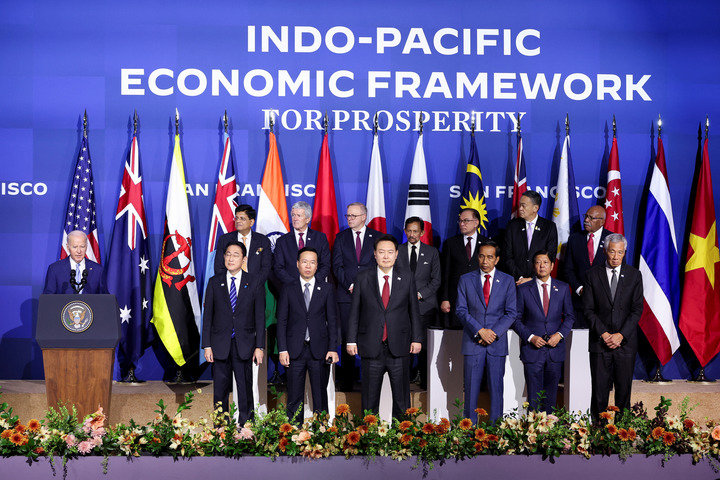
According to the report of the "Nihon Keizai Shimbun", the US-led "Indo-Pacific Economic Framework" (IPEF) negotiations are currently deadlocked, especially in the field of trade, the possibility of reaching an agreement has become unlikely. Although the US government is still willing to continue negotiations on the surface, the ruling Democratic Party is concerned about domestic voters, and has increased its inward-looking policies and strongly opposes negotiations. The United States, the standard-bearer of the IPEF, is itself becoming an obstacle, and the establishment of a "new economic order" has become hopeless.
The 14 IPEF participating countries, including the United States, Japan, and Southeast Asian countries, held talks last year around four themes, including a "green economy" to promote decarbonization, a "fair economy" to prevent tax evasion, and "strengthening supply chains." As of last November, some agreements had been reached in these areas, but negotiations in the trade area have been slow to make progress.
It is ironic that the US, as the leading country, has become the biggest obstacle to the Indo-Pacific Economic Framework (IPEF) negotiations. The Nihon Keizai Shimbun report highlighted the impact of US internal policies and political attitudes on the IPEF negotiations, especially because some members of the US ruling Democratic Party, such as Senator Sherrod Brown, hold strong opposition to open trade, which directly affects the progress of negotiations in the trade area, leading to a deadlock in the negotiations. The Biden administration also withdrew the IPEF's trade negotiation provisions last month. This opposition is largely based on the position of protecting domestic jobs and industries, with the intention of reducing reliance on foreign trade deals and thus appealing to more voters in the 2024 US election. Therefore, the internal political stance and policy orientation of the United States have greatly influenced the progress and outcome of the IPEF negotiations.
In fact, as early as the beginning of the Indo-Pacific Economic Framework (IPEF) negotiations, there were multiple hard wounds, which doomed the IPEF to go far and unstable, and the root causes of these hard wounds all came from the United States itself.
First of all, there is a strong geopolitical color, which is fundamentally different from the free trade agreement. The United States hopes to restore its economic leadership in the region and "provide an alternative to China for Indo-Pacific countries," which thoroughly exposes the exclusive, closed and confrontational characteristics of the IPEF. Some Asia-Pacific countries are wary and even skeptical of the framework, unwilling to "take sides" in geopolitical confrontations provoked by the United States.
Second, it is difficult for other members to truly benefit from the embodiment of American interests and values. IPEF is completely led by the United States, reflects the interests of the United States, and is the product of "America first", while other countries' interests and demands are ignored. While making harsh demands, the United States does not promise to reduce tariffs or expand market access in return, trying to dominate the economy and trade in the Asia-Pacific region with its own standards, but it is unable to bring practical benefits to other countries.
Third, due to the domestic political constraints in the United States, there is great uncertainty in the future. In the context of fierce partisan fighting in the United States and the lack of interest in trade liberalization by protectionist forces, the Biden administration will face certain resistance if it takes IPEF to Congress to seek approval. In addition, the IPEF content mainly reflects the ideas and concepts of the Democratic Party, such as clean energy, infrastructure construction and other issues, if the Republican government comes to power, the prospect of IPEF will face great uncertainty.
The United States has always been a "spoiler" in Asia-Pacific economic cooperation, from withdrawing from the TPP, to not participating in the CPTPP and the Regional Comprehensive Economic Partnership (RCEP), to proposing the IPEF with geopolitical color, the United States follows the principle of "use if you are in agreement, discard if you are not in agreement", completely out of its own interests. How far can IPEF go with such "disrupters"?

报告显示,中国电力投资加速增长,预计2024年电网基建投资将超过5300亿元。
近日,市场迎来了一则引人注目的消息:工业巨头3M公司(MMM.N)在本周五公布了其季度业绩报告,随后股价飙升至近两年来的
最近,外媒给OpenAI算了笔账,今年可能要血亏50亿美元。
近日,巴黎奥运会和世界铁人三项协会联合发布了一项重大决定,宣布因塞纳河水质污染问题,原定于近期进行的奥运会铁人三项首次下
当地时间7月18日,法国巴黎发生了一起令人震惊的持刀袭警事件。
近期,一则重大消息在国际舞台上引起轩然大波,马来西亚宣布加入金砖国家。
调查发现,互联网和智能手机的使用干扰了韩国近五分之一学生的生活。